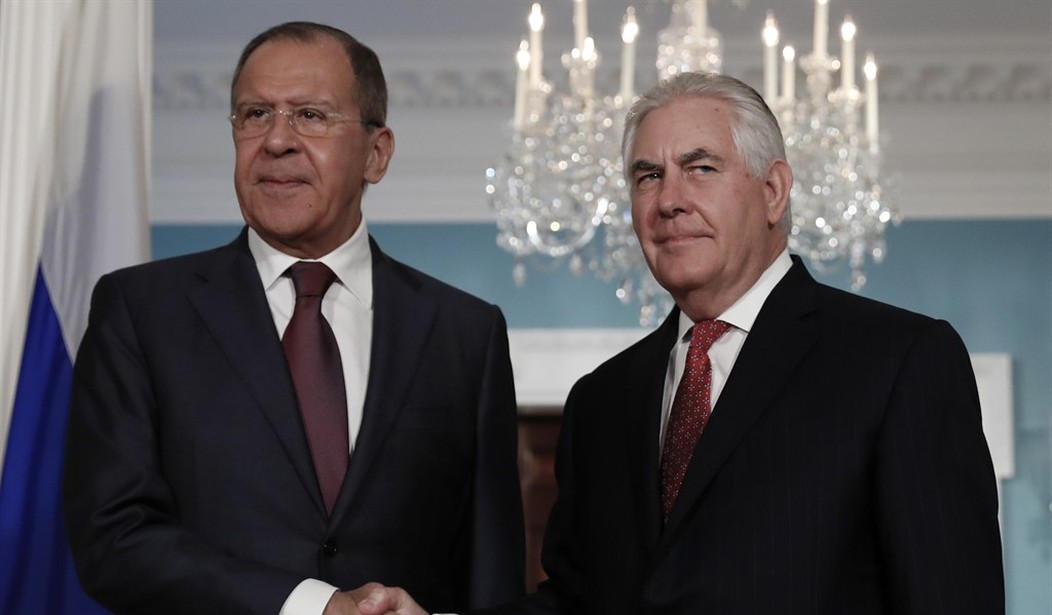What should the Trump administration do to respond to Russia’s demand to cut US diplomatic staff by over 700 positions? Should the US respond at all? Secretary of State Rex Tillerson told the media at the ASEAN conference today that he’s still considering his options after meeting with Russian foreign minister Sergei Lavrov:
The Trump administration is preparing a response to Moscow’s demands that the U.S. drastically cut its diplomatic presence in Russia, Secretary of State Rex Tillerson told reporters Monday. …
Tillerson added that while the Russian hack of Democratic National Committee computers before the presidential election caused “serious mistrust,” the Trump administration will continue seeking cooperation with Moscow and cooperation is a necessity for the two nuclear-armed countries.
“We want to work with them on areas that are serious national security interest to us while at the same time having this extraordinary issue of mistrust that divides us,” Tillerson said. “That’s just what we, in the diplomatic part of our relationship, are required to do.”
“I don’t think it is useful to just cut everything off on one single issue,” he added in reference to the hacking.
One question Tillerson reportedly asked is where the Putin regime came up with the number 755 for its required reductions. The US does not have that many diplomatic employees in Russia, which confused the State Department initially. Presumably Russia is demanding a reduction in all positions, including Russian employees of these diplomatic missions. The confusion has led to a delay in response.
Another open question is whether a response is necessary or wise. Counting native employees, the number demanded by the Russians would bring parity between the two nations on total employees of diplomatic missions. The previous disparity had not been an issue, it seems, while rhetoric between the two nations was somewhat less heated. At this point, a further response would prompt another answering response, and so on. Whether or not one worries about Russia’s antagonistic approach to the US and the serious risk it poses (and we should be concerned about that), more diplomatic fights will hardly work to improve the situation.
Russia has plans to work around the new sanctions, which seem to be aimed at marginalizing the US and limiting its economic power:
Russia will speed up work on reducing dependency on U.S. payment systems and the dollar as a settling currency, RIA news agency cited Deputy Foreign Minister Sergei Ryabkov as saying on Monday. …
“We will of course intensify work related to import substitution, reduction of dependence on U.S. payment systems, on the dollar as a settling currency and so on. It is becoming a vital need,” Ryabkov was quoted as saying.
“(Otherwise) we will always sit on their hook, exactly what they need,” he said, referring to the United States.
Russia has already introduced a new national payment system to cut reliance on Western systems, such as Visa and MasterCard.
That will certainly eat into the earnings of those providers, but it may also further limit Russian travel and tourism. The Mir (“Peace”) card has gained wider acceptance in Russia, and Reuters reports also in Russia-occupied Crimea, where Western banks are prohibited from operating because of sanctions applied after the 2014 seizure of the peninsula. However, it won’t work outside of Russia, and traveling on a cash-only basis is not exactly a smooth strategy. On top of that, the large cutbacks in American diplomatic missions will create long backlogs for visa applications from Russians who want to come to the US to study, work, and visit. As for global financial transmissions, the Putin regime will find that working around US sanctions will be possible, but not easy. Banks will not want to get locked out of those systems and lose access to American markets.
The dramatic Russian response to the sanctions tells us volumes about how sharp they will bite. Perhaps Tillerson will be better advised to demonstrate some strategic patience, and let the Russians come to us first to negotiate better terms.







Join the conversation as a VIP Member